Top News
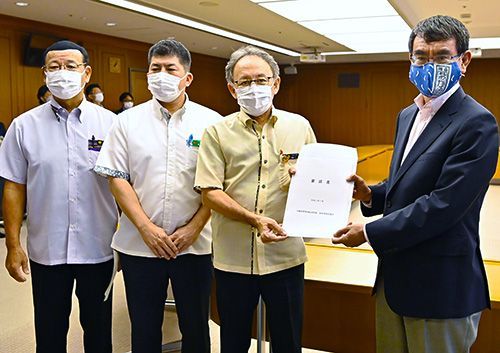
July 16, 2020 Ryukyu Shimpo
Tokyo – Okinawa Governor Denny Tamaki visited the Prime Minister’s Office, the Ministry of Foreign Affairs (MoFA), and the Ministry of Defense (MoD) on July 15, to compose an official request demanding the U.S. institute policies to thoroughly administer PCR tests to any U.S. military personnel entering the country via U.S. bases, and to suspend the transfer of military personnel from the U.S. to Okinawa. The statement also requests the quarantining of U.S. military personnel as outlined by Japanese law, and a review of the Japan-U.S. Status of Forces Agreement (SOFA). Governor Tamaki stressed to reporters, “As the prefectures, cities, and towns that host bases are working on this, I want to make sure we are telling the U.S. what they need to be told.”
Governor Tamaki is making this request as the chairman of the “Okinawa Prefectural committee for the promotion of diverting land for U.S. military use and base issues,” which is comprised of Okinawa Prefecture and the towns and cities that host bases. Kin mayor Hajime Nakama and Ginowan mayor Atsushi Toma also made the trip, and they expressed their concerns around the spread of the virus as the mayors of the towns that host Camp Hansen. The Japanese government did not respond to questions regarding the specifics of the request’s contents.
At the MoD, Governor Tamaki, who met with Defense Minister Taro Kono, emphasized, “This situation has burdened the people of Okinawa with a great uneasiness.” Minister Kono apologized, saying “I am deeply sorry that this uneasiness has arisen,” and indicated that in order to prevent the base becoming a source of spreading the disease, they are hoping to coordinate with the bases. At MoFA, Minister of Foreign Affairs Toshimitsu Motegi received the written request, responding, “We will work in earnest [to resolve this.”
At the Prime Minister’s office, they were received by Kazuhiro Sugita, Deputy Chief Cabinet Secretary. Governor Tamaki also visited Joseph M. Young, Chargé d’Affaires ad interim at the U.S. Embassy in Tokyo to request measures be put in place.
(English translation by T&CT and Sam Grieb)
Go To Japanese
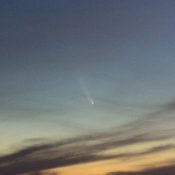
July 16, 2020 Ryukyu Shimpo
By Tomoe Oshiro
On July 12, Aguni-jima resident Masayoshi Shikata, 50, succeeded in photographing Comet NEOWISE (C/2020/F3).
Comet NEOWISE was discovered on March 28 (Japan time) through NASA’s infrared observation satellite NEOWISE. The comet revolves around the sun in an elliptical orbit and will approach the sun again in approximately 6,800 years. Comet NEOWISE was closest to the sun on July 4; it is currently observable low in the northeastern skies before sunrise.
Comet NEOWISE will continue to be observable in the northwestern skies before sunset beginning mid-July and will be closest to earth on July 23.
Shikata said, “I will track the comet until late July, and I hope to show it to the children of Aguni-jima if possible—they won’t get a chance to see it again.”
The comet is expected to visually fade by late July and by end of August the comet will be unobservable by the naked eye.
(English translation by T&CT and Monica Shingaki)
Go To Japanese
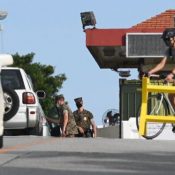
July 14, 2020 Ryukyu Shimpo
The Okinawa prefectural government announced it confirmed 32 new COVID-19 cases at U.S. Marine Corps Air Station Futenma and one case at Camp Kinser, between July 12 and 13. Additionally, the Kadena Air Base Facebook page announced on the night of July 13 that one servicemember tested positive. This brings the total number of coronavirus cases at MCAS Futenma to 71, and the number of all confirmed cases among U.S. military servicemembers stationed in Okinawa (reported between March 28 and June 13) to 99. The U.S. Marine Corps in Okinawa indicated before July 13 that clusters of infections surfaced at MCAS Futenma and Camp Hansen. The same day, Prefectural Deputy Director General of Health and Sanitation Toru Itokazu indicated that the 32 individuals of MCAS Futenma who tested positive had gathered in the same cluster. So far, the prefectural government has not included the number of U.S. military-related cases in its total count of all confirmed COVID-19 cases on Okinawa.
The U.S. military has not provided the Okinawan government with any information on how and where its servicemembers contracted the virus. Itokazu said he cannot rule out the possibility that the movement of servicemembers from the U.S. to Okinawa may have contributed to the outbreak and that he will expeditiously work to gather information from the U.S. Meanwhile, a Japanese civilian who attended a military Fourth of July party stated that, “An infected U.S. servicemember was at the party.” Furthermore, on July 7, five servicemembers residing on MCAS Futenma tested positive and a number of them had travelled off base. Their off-base movements are unknown.
Reiko Oshiro, Director of Health and Medical Affairs in Okinawa, said that the U.S. communicated that the confirmed COVID-19 cases on base were either asymptomatic or showed mild symptoms. Oshiro believes that, as a general rule, if any individuals on base are showing severe symptoms, the individual should be kept on base or in the Navy hospital. Itokazu, on the other hand, said: “If the Navy hospital were to reach capacity, and a servicemember’s symptoms worsen rapidly, a local hospital off-base should receive that patient.” The Okinawa government is currently working to set up channels to discuss the matter with the Navy Hospital.
Given the recent coronavirus outbreak on base, Oshiro said that any concerned base employees who contact the prefecture’s public healthcare center may receive a test, “Regardless of whether they’ve come into contact with an infected person.” Oshiro explained that specimen collection centers will be set up in the Chubu Region and that the prefectural government is currently rushing to finalize an agreement with medical facilities that have the ability to collect specimen for testing.
A representative of Kadena Air Base explained that, according to early investigations, the one servicemember who tested positive on July 13 was not confirmed to have been in contact with anyone off base, although a follow-up investigation is currently underway. Kadena Air Base has not disclosed any information on possible transmission routes.
(English translation by T&CT and Monica Shingaki)
go to japanese
July 12, 2020 Ryukyu Shimpo
The number of confirmed coronavirus cases on U.S. military bases in Okinawa rose to 61 from July 7 to 11. July 11 saw 45 cases, nearly three times the number (16) the previous day. The Okinawa Prefectural Government assesses that clusters are occurring at U.S. Marine Corps Air Station Futenma and Camp Hansen.
The problem is that the U.S. military, which is responsible for the matter, has not revealed records of actions by and profiles of those infected or the measures taken with respect to those infected and those with whom they were in close contact. This information is essential in preventing further spread of infection, and is crucial to protect the lives and health of Okinawans.
The Japanese and U.S. governments have executed a memorandum of understanding stipulating that the U.S. military and the Okinawa Prefectural Government exchange information in the case of an outbreak of infectious disease. Nonetheless, if the U.S. military refuses to release even the bare minimum of necessary information, all U.S. bases in Okinawa should be put on lockdown and movement of people associated with the U.S. military should be stopped. That is the only way to protect Okinawans from infection.
In Japan, when a case of coronavirus infection is confirmed, the relevant prefectural government publicly releases, on the day the case is confirmed, the profile of and record of actions by the infected patient as well as the infection route and events leading up to the testing. This is then used for identifying people with whom the patient was in close contact and otherwise carrying out epidemiological surveys in order to take preventative measures.
The U.S. is far ahead of the rest of the world with more than 3 million coronavirus cases, and coronavirus cases among people associated with the U.S. military are increasing everywhere. Nonetheless, in March, the U.S. Department of Defense announced that it would not be publicizing information on the number of coronavirus cases by base and by unit, on the grounds that this information would lead to conjectures on the military’s operational capacity.
The 2013 memorandum of understanding between Japan and the United States stipulates that the U.S. naval hospital and the local public health center notify each other when a case of infectious disease comes to light. According to the Okinawa Prefectural Government, however, it has not been able to obtain all relevant information concerning those infected with coronavirus. The U.S. military’s prioritization of military operations and refusal to appropriately disclose information to the local society shows its lack of regard for Okinawans’ lives and health.
Many people associated with the U.S. military have come to Okinawa for summer relocation. Many of them arrived at Naha Airport on civilian aircraft. The U.S. Marine Corps states that people arriving from overseas are quarantined for 14 days, but there is no way to verify from outside the bases whether this measure is being strictly adhered to.
In fact, large groups were observed in several locations gathering in close proximity and engaging in festivities on the fourth of July, and Japanese locals also participated in these festivities. Locals are also uneasy because the U.S. military has been using off-base civilian hotels as quarantine facilities with no explanation of this policy to the local residents.
The U.S. military claims that it has locked down both of the bases in question, but coronavirus cases are occurring at other bases, such as Kadena, as well. All of the bases should be put on lockdown. The prefectural government should take utmost efforts to discover cases as they arrive by requiring everyone arriving in Okinawa, including those associated with the U.S. military, to undergo PCR tests at the airport.
Since three coronavirus cases were discovered at Kadena Air Base in March, the U.S. military has been unable to stop the spread of infection, and the Japanese government has done nothing but ratify the U.S. military’s approach. The Japanese and U.S. governments are both responsible for the crisis we face now. The Japanese and U.S. governments must immediately disclose information and carry out epidemiological surveys to prevent further infection.
(English translation by T&CT and Sandi Aritza)
go to japanese
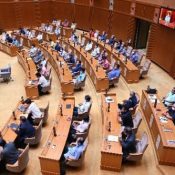
July 11, 2020 Ryukyu Shimpo
With confirmed cases of COVID-19 continue to climb in U.S. military bases in Okinawa, such as in Camp Hansen in the northern part of the main island, the Okinawa prefectural assembly (Noboru Akamine, chairman) unanimously passed a resolution and official statement on July 10 calling for a report disclosing information such as where infected individuals and those who came in close contact with them went outside the base, as well as things such as a drastic overhaul of the Japan-U.S. Status of Forces Agreement (SOFA). The resolution also asks U.S. and Japanese authorities for such things as a thorough quarantine for those who have been infected, the number of people infected as well as the number of people they came in close contact with, and a detailed history of where they went. Additionally, they requested a revision of SOFA, and proper application of Japanese laws such as the Quarantine Act.
Confirmed cases started to rise in U.S. bases in Okinawa starting at the beginning of July, but since the 9th the number of new cases and the movement history of infected individuals have not been made public to media outlets.
Okinawa Governor Denny Tamaki held a press conference July 10, and on the same day vice-governor Kiichiro Jahana explained their requests to Brigadier General William Bowers, commander of Marine Corps Installation Pacific, which included: (1) publicly disclosing the number of cases; (2) implementing protection measures in line with Japan’s such as administering PCR test to all military personnel who enter the country, and (3) enacting isolation measures for those transferring in and out of Okinawa or Japan as a rule on the bases. He commented that they did not intend to release their own figured for confirmed cases in Okinawa, and that “they wanted to align with U.S. policies.”
The official statement and resolution passed by the assembly was proposed by representatives from each of the assembly’s factions. Dai Shimabukuro, a member of the Liberal Democratic Party (LDP), Okinawa’s majority faction, explained the reason for proposing the resolution and statement, saying, “This is the first new confirmed case in almost two months, we are worried about the virus spreading, and so we are demanding that the U.S. military stationed in Okinawa take further measures to prevent its spread.”
The resolution was addressed to the U.S. ambassador to Japan, the commander of U.S. forces in Japan, the Okinawa Area Coordinator (OAC), the commander of the 3rd Marine Expeditionary Force (3MEF), and the consul general in Okinawa. The official statement was addressed to the prime minister of Japan, as well as the Foreign Minister, Defense Minister, and the Minister of State for Okinawa and Northern Territories Affairs. Due to concerns around spreading COVID-19, the resolution document and official statement were mailed instead of delivered personally to relevant agencies.
(English translation by T&CT and Sam Grieb)
go to japanese
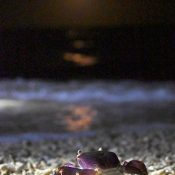
July 8, 2020 Ryukyu Shimpo
On Miyagi Island in Uruma City in Okinawa, the egg-laying season for crabs is approaching.
On July 6 under a full moon, a scene can be seen of countless crabs crossing the street, headed in the direction of the moonlight, and arriving at the edge of the water where they proceed to release their eggs into the ocean.
The crabs live in the meadows and fields near the coast. During breeding season, when the female crabs are full of eggs, they travel up and down over rivers and ditches on their way to the beach.
Nana Karimata, 30, from Okinawa City went to the waterline with her son Tasuku, 2, to watch the crabs lay their eggs.
“We were amazed by the sight of the crabs coming to the beach to lay their eggs, as if they had been lying in wait for the moon to rise. Since the crabs often cross the roads at this time, please reduce your speed when driving when you see them,” she noted about the event while also cautioning drivers.
(English translation by T&CT and Sam Grieb)
go to japanese
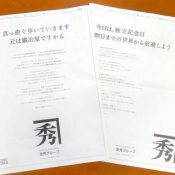
July 8, 2020 Ryukyu Shimpo
“[We are] straight as an arrow, we started out as blacksmiths, afterall.” “Today is Idependence Day. Make the world better today than it was yesterday.”—These newspaper ads were taken out in the Ryukyu Shimpo and the Okinawa Times by the Kanehide Group (chaired by Morimasa Goya), which operates construction, supermarket, steel, and hotel businesses.
The ads in the two papers were not the same, but shared a similar message: protect the freedom and dignity of each individual, regardless of sex, race or ethnicity. It also promised that Kanehide Group will work together with uchinanchus (Okinawans) around the world, and called for a “new era of Okinawa”’ in which “everyone is happy,” whether they be a resident or visitor.
Ads that aim to establish or enhance a company’s image, instead of promoting a product, are often taken out on the company’s founding anniversary, but Kanehide Group was founded on the 25th of May. Why did it publish branding ads on July 4?
The answer to this question can be found in the ads; the two versions printed in the Ryukyu Shimpo and Okinawa Times both read: “July 4 is American Independence Day, the day the U.S. won its freedom and dignity. On July 28, the Republic of Peru, where many Okinawan descendants reside, declared its independence from colonial rule.”
Kanehide Group Chair Goya touched on how people around the world are protesting the recent police brutality case in Minnesota, in which an African American man was killed by a white police officer. He then explained the ad placement and said, “On the very day the U.S. won its freedom and dignity, I wanted to ask everyone to recognize and value the human rights of uchinanchu.” He added, “I also want Okinawans to be accepting of diversity of thought.”
Goya is also the honorary consul to the Consulate of Peru in Okinawa.
(English translation by T&CT and Monica Shingaki)
go to japanese
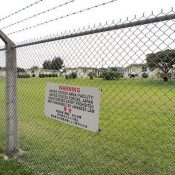
July 10, 2020 Ryukyu Shimpo
It came to light on July 9 that the U.S. Marine Corps has rented a hotel in Chatan Town as a countermeasure to the spread of the novel Coronavirus. The hotel will be used as an isolation facility for personnel from overseas who are being reassigned. The Chatan Town government announced this information after having received it from the Okinawa Prefectural Government. The number of persons to be accommodated and the duration the hotel’s use is still unknown. Mayor Masaharu Noguni of Chatan Town said that U.S. military personnel coming to Okinawa “should be isolated and managed on U.S. military facilities for an appropriate period of time”, and on July 8 made an objection to the Ministry of Foreign Affairs’ Okinawa Liaison Office.
In response to the spread of the novel Coronavirus, the Japanese government has designated the United States as a country from which visitors will be refused entry to Japan. However, U.S. military personnel, civilians in military employ, and family members are exceptions because the Immigration Control and Refugee Recognition Law applies to such persons under the U.S.-Japan Status of Forces Agreement.
According to the Chatan Town government, the U.S. military personnel reassignment period will be July and August, approximately two months long, and the explanation from, inter alia, the MOFA Okinawa Liaison Office concerning the renting of the hotel is said to be because the accommodations on military base compounds are insufficient.
Mayor Noguni stressed the point: “I want there to be consideration of methods by which reassigned personnel can be isolated within military base compounds, such as by extending the personnel reassignment period and redistributing personnel numbers”. On July 9 the Chatan Town government sent objection letters to the MOFA Okinawa Liaison Office and the U.S. Consulate General’s Office in Okinawa. In a few days’ time an objection will also be filed with the Okinawa Defense Bureau.
Professor Manabu Sato (political science) of Okinawa International University spoke about isolation measures being decided while there is no information available concerning the quantity of accommodations on military base compounds or the number of persons being reassigned from the United States, where numbers of infected persons continue to rise. He pointed out “It is essential to deliberately inform us of what is abnormal and why it is that even bare minimum, fundamental information cannot be shared”. Additionally, he concluded, “What I am saying is that quarantine or two-week isolation should be confined to military base compounds”.
(English translation by T&CT and Erin Jones)
go to japanese
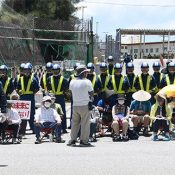
July 7, 2020 Ryukyu Shimpo
(Henoko reporting team) On July 6, citizens gathered in front of the gate to the U.S. military’s Camp Schwab to protest the construction of a new base in Henoko, Nago, Okinawa as part of the relocation of U.S. Marine Corps Air Station Futenma. The signboard showing the number of days the sit-in has continued read 2192, and on July 7, the sit-in will enter its seventh year. “People keep coming to the front lines even as their old bones grow weary. I feel many emotions at once,” said Hiroji Yamashiro, director of the Okinawa Peace Movement Center.
Around 30 people participated in the sit-in in front of the gate, raising their voices in protest and saying, “stop the illegal construction!” The Defense Bureau continued its work of bringing in materials to be used for construction, and a total of 229 vehicles carried in materials. Shipment of materials continued at the Ryukyu Cement pier in Awa, Nago and the Shiokawa area of Motobu Port in Motobu. “The new base construction is said to be technically impossible; we must keep raising our voices until the government gives up,” said Yamashiro, expressing renewed determination.
(English translation by T&CT and Sandi Aritza)
go to japanese
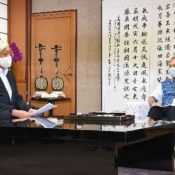
July 6, 2020 Ryukyu Shimpo
Former Defense Minister Gen Nakatani of the Liberal Democratic Party shared his “mega-float” proposal with people close to Okinawa Governor Denny Tamaki as an alternative plan to reclaiming land at the new base construction site in Henoko, Nago City, citing the infeasibility of completing the ongoing construction. However, on the morning of July 6, Governor Tamaki told reporters that when he spoke with Nakatani on July 3, there was no mention of a mega-float. The governor indicated his disapproval and said, “It appears the conversation has gone back in time.”
During his July 2-4 visit to Okinawa, Nakatani met with Nago City Mayor Taketoyo Toguchi and Governor Denny Tamaki. On July 4, Nakatani had dinner with Morimasa Goya, chair of the Kanehide Group and chair of the governor’s koenkai (organizations that mobilize voters and funds for politicians); and with Taku Yamazaki, the former vice president of the LDP. During the dinner, Nakatani shared his doubts about the land reclamation work at Henoko and proposed installing a mega-float instead.
Governor Tamaki said that in his meeting with Nakatani, the former Defense Minister did not voice such doubts. He said, “[I] pointed out the issues surrounding the land reclamation work [at Henoko], such as the soft seabed, as cause to stop the construction and to open up a dialogue. Mr. Nakatani was not opposed to it.”
Following his meeting with Governor Tamaki, Nakatani told reporters that reclaiming land at Henoko is “Technically not impossible.”
(English translation by T&CT and Monica Shingaki)
go to japanese
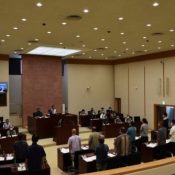
July 3, 2020 by Ryukyu Shimpo
Kadena – The Kadena city council (Naoki Tokusato, council president) held an emergency session on July 2, where they unanimously passed an official statement and protest resolution against a fire that broke out in a hazardous materials facility in Kadena Air Base June 22. The council took issue with the tardiness in communication with local authorities, despite local governments around the bases requesting an accurate and swift report after each incident or accident, both currently and previously, and commented, “We cannot help but feel a truly regrettable and strong anger.”
In the written statement and protest resolution, the council demanded that (1) the U.S. military thoroughly investigate the cause of the fire, and immediately make the result of the investigation public; (2) Devise an effective policy to prevent the incident from re-occurring; and (3) Adhere to the notification system, and quickly and accurately inform the area about all incidents.
The official statement was addressed to the head of the Okinawa Defense Bureau (ODB) the Minister of Defense, and the governor of Okinawa, and the protest resolution was addressed to the commander of the U.S. Air Forces 18th Wing and the Okinawa Area Coordinator. On July 3, the members of the special committee for base policy handed the official statement directly to ODB chief Toshinori Tanaka.
(English traslation by T&CT and Sam Grieb)
go to japanese










 Webcam(Kokusai Street)
Webcam(Kokusai Street)


